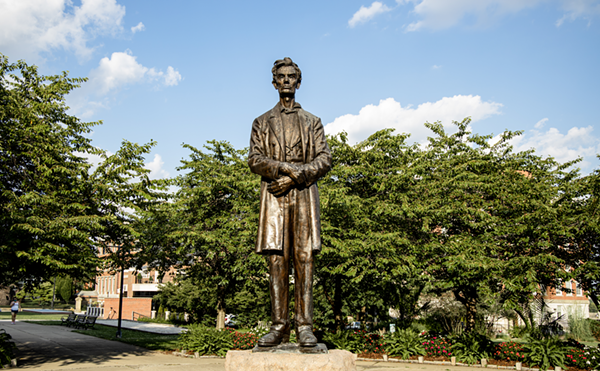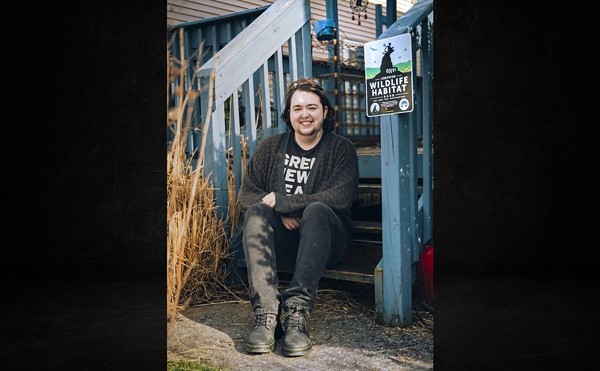|
Hollywood is not always what it seems. The media, which thrives on excess as much as the entertainment industry itself, capitalizes on two basic scenarios. First, there's a celebrity's triumphant walk through paparazzi lights. Then, there's the $20-million superstar inside a lowly jail cell or rehab clinic having been booked for embarking on a cocaine bender and beating up his wife.
Real Hollywood is usually not so melodramatic. The inhabitants out there aren't terribly different than the rest of us. There is such a thing as blue-collar Hollywood: guys who will participate in any film, regardless of the size or significance of the role, just to receive a paycheck at the end of the day. Think Dan Hedaya or the late J.T. Walsh.
Then there are those actors and actresses who are on the celebrity fringe. They're not household names yet, but they're perfectly well-known to die-hard movie buffs.
They rub elbows with the stars but are not yet in the position to make ridiculous demands nor to cuff the set flunky on the side of the head because he brought a cup of cold coffee.
Take the new Adam Sandler film, for instance. Big Daddy is his first film as an "official" superstar, but Sandler is really the least interesting person in it. After all, he plays the same character over and over: a bum who makes good. To make matters worse, Big Daddy is utterly lacking in the over-the-top spasmodics that made his first two films so enjoyable. Apparently, he reserves his best stuff for his comedy albums; although Big Daddy is, as longtime friend Rob Schneider pointed out, the most accurate reflection of the man himself.
Schneider is a "co-star" in the film. After his hilarious cameo as a grimy swamp rat in The Waterboy, he was chosen to appear in Big Daddy as the foreign delivery boy. A publicist said Schneider's role was "beefed up" for Big Daddy. Compared to what? Next to The Waterboy, anything he did would seem beefed up. But anyone going in expecting to see a substantial appearance by Schneider is going to be disappointed.
"Adam said he had a part for me in his new movie," he said. "I looked at it and said, 'There's no role here. It's two lines.' But it was better than The Waterboy, which was one line. But luckily it turned into a role."
Schneider is best known for his stint on Saturday Night Live, his comic relief against Sylvester Stallone in Judge Dredd ("If I had enough drinks I could understand him," Schneider said) and Demolition Man ("How does the three seashells work?"), and his short-lived television show Men Behaving Badly. Schneider quickly learned how the inherent collaborativeness of television can seriously dilute the creative vein.
"It's better to have all the control yourself," he said. "There's too many cooks in the kitchen. With that show, it was always about power and never about quality. It's frustrating because there are censorship issues. You have to crank out 22 shows a year so the quality dips and flows. There's a studio, a network. There's just too many people in the way."
Obviously, comedy is Schneider's specialty. He said stand-up comedy was America's big thing in the 1980s and he was in the right place at the right time.
"When you're young, you think everything is funny because you don't have any taste yet," he said. "Taste is the most important thing in any art form. When you get in your early 20s, you think everything else is crap. It's kind of like Punk Rock, a movement that thought everything was crap, that everything sucked and we're just going to start from here. But when you do it for a while, you can't help crossing over to the mainstream. And if you see a comedy that isn't particularly funny, you can say that you at least understand what they're trying to do; that they're just guys trying to make a living." Schneider felt that comedy is an easy target for critics.
"For some reason, it's so easy to slam a comedy," he said. "You can end a drama with everyone being killed, and people will think it's the greatest. It's open to interpretation. If you see 400 Blows, Truffaut has the kid basically walking into the ocean to drown himself. That's one interpretation but he at least flaunted the idea. But comedy is looking for a specific response whether you get it or you don't. There are some magazines that make a living slamming people. It's just ugly. I read every review of Judge Dredd and it was just vicious. They hated Stallone and they wanted to hate Stallone. It wasn't about the movie at all. So, after that, I stopped reading reviews. I don't mean to say all critics are bad, because I respect the guys that really love movies. I like to get a good review but that's not why I'm doing it. "
Joey Lauren Adams plays Sandler's would-be girlfriend, Layla, in the film. She originally emigrated to Hollywood from Arkansas. Coming from a devoutly religious family, she couldn't claim any showbiz lineage that helps many young actresses, with the exception of a great-uncle who appeared on Hee-Haw.
As a young Midwestern girl naturally cowed by Hollywoodland, it didn't take her long to feel like a foreigner.
"It was tough," she said. "I felt that everyone knew more than me and that I grew up in this vacuum. Everyone always had a new hairstyle or a new fashion thing and I thought they were geniuses. It took me awhile to realize not everyone is like that. To this day, I don't go out a lot."
Joey landed small roles in films like Richard Linklater's nostalgia picture Dazed and Confused. She appeared in Michael with John Travolta, S.F.W. and Bio-Dome. But her biggest visibility probably came when she stumbled into the middle of Kevin Smith's Jersey trilogy with a supporting role in Mallrats and finally a breakout role in Chasing Amy, for which she received a Golden Globe nomination.
"My mother saw Chasing Amy and that was hard for her," she said. "My father is very religious and we never talked about it. But I never got the feeling he was judging me. He was mostly concerned about my spirituality. I consider myself a Christian, just not as extreme as him."
The positive reception to Chasing Amy represented a turning point for Adams.
"I worked for eight years waiting for that great part, that great female role," she said. "The attention was great but I got bad reviews as well. People were pounding on my door to tell me about a Golden Globe nomination and I didn't know what they were talking about. I had to unplug my phone for that whole thing. But then I started thinking that the world was my oyster and I could do whatever I wanted, and that didn't turn out to be the case either."
It turns out that one of the more memorable scenes of that film, the screaming fight in the hockey arena with Ben Affleck, was just as pivotal for her.
"Those are the rare moments in acting that you live for," she said. "I didn't know if I could get through it. Originally, we were supposed to do it in one take and I could not mess up from start to finish. Honestly, I blacked it out. The emotional high point reached such a level that I woke up with the crew clapping."
But Adams quickly learned that you're only as good as your last hit. And when the furor over Chasing Amy died down, it was back to pounding the pavement. In fact, her association with the lesbian character in the film has even hurt her in some ways.
"She was such a specific character, but I did get A Cool, Dry Place right after Chasing Amy, which I had to audition for. When you first start out, you have to read for the casting director and, if they like you, they pass you to the director. I can bypass that now and go straight to the director. So it's helped in little ways but not in a big way where I never have to audition again and I can just do what I want."
Now, like many young actors, she's still searching for that next great script that will entail some meaningful work. But unless one has deep pockets, the only recourse is to successfully sell it to a studio money man.
"There was a script that came along with James Garner," she said. "It was a really small, low-budget independent film and we couldn't get it financed. They wanted Renee Zellweger to do it. It's so frustrating. Chasing Amy was a success so why can't we get this movie made? That's one of the reasons I decided to do a commercial film, one that does well at the box office so I can go back and do this other project. There's a little time frame where you have to capitalize on your visibility in a film that's doing well, because next month there'll be another big blockbuster. It's sad because I'm much prouder of my performance in Chasing Amy. Big Daddy is sweet and funny and I look cute. But I can't say, 'Go check me out. I'm amazing.' "
Having written poetry and short stories in the past, she has considered sitting down at the laptop and creating her own story.
"I'd like to start writing," she said. "Because it's so frustrating to see all these scripts and my part is always the girlfriend with the fine ass. So I think what I'd like to see come under my door and I'm going to try and write it. I'd like to make a film that portrays Middle America or the South in a real way. In most films like that, the characters are caricatures, or it's a normal guy surrounded by caricatures, the odd people or the guy with the crazy cow. I'd like to portray the way most America is in a real way."
Like anything else, typecasting is a worry. With a film like Mallrats, its easy to get stuck in a never-ending rut of playing dizzy sexpots.
"You do find yourself playing into how people want you to look," she said. "But now I think I can change that. Like for Big Daddy, I chose to dress a certain way, to look more conservative. I could've dressed differently and the character would have come across in a way other than an independent, career-minded woman. But sometimes you have to take what you can get." ©





